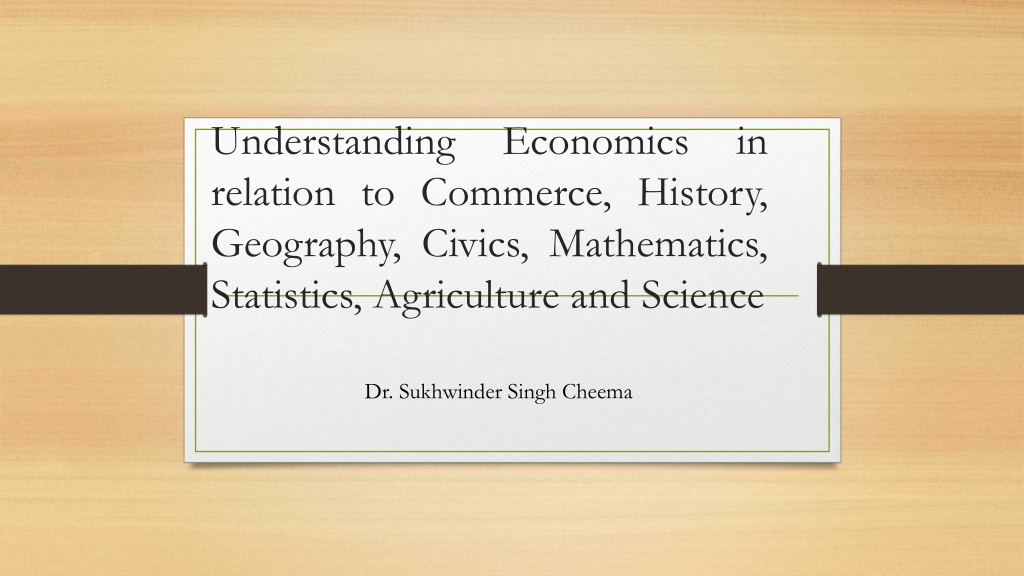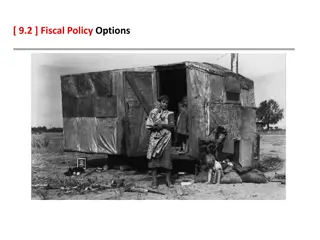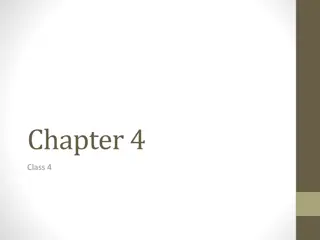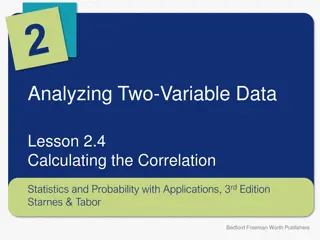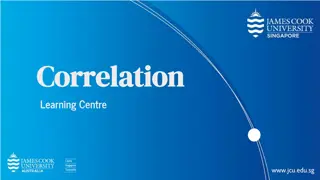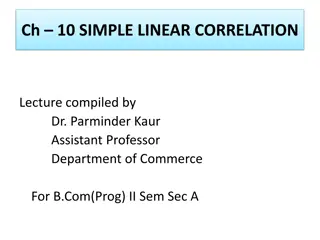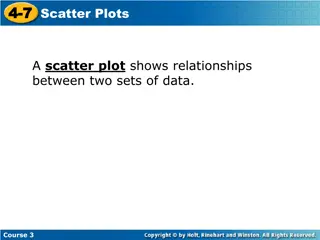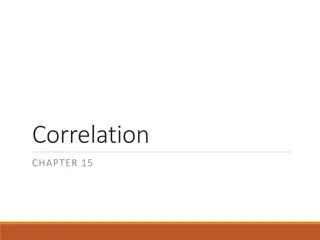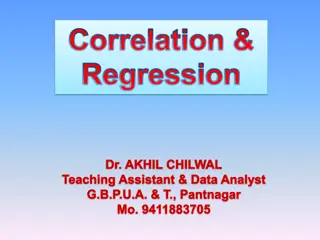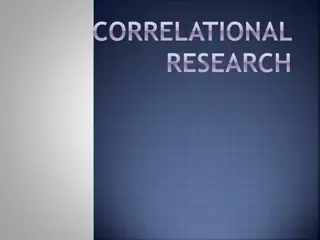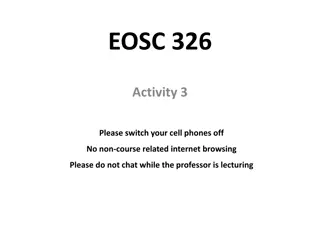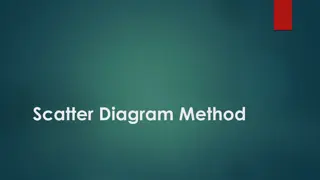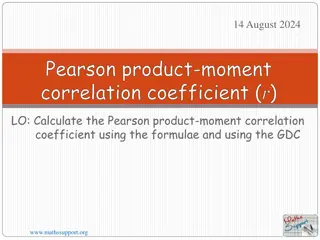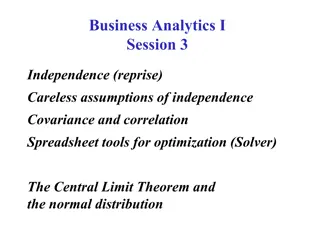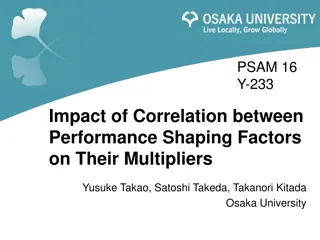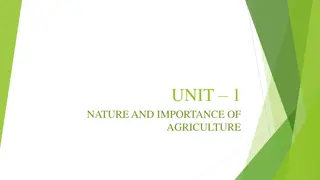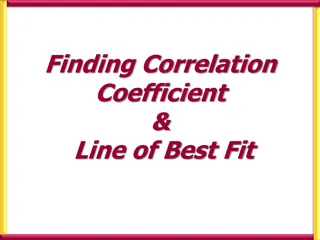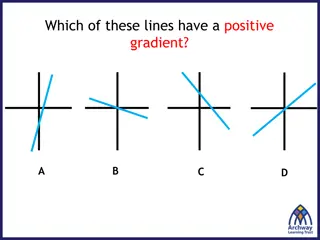Understanding Correlation in Economics and Education
Correlation in education refers to the technique of establishing reciprocal relationships between different subjects to enhance understanding. The etymological meaning of correlation stems from Latin roots, signifying interlinking. Various types of correlation such as vertical and horizontal correlation play crucial roles in integrating subjects like commerce, history, geography, and economics. Understanding correlation aids in analyzing relationships between variables and enhancing the learning experience across diverse disciplines.
Download Presentation

Please find below an Image/Link to download the presentation.
The content on the website is provided AS IS for your information and personal use only. It may not be sold, licensed, or shared on other websites without obtaining consent from the author. Download presentation by click this link. If you encounter any issues during the download, it is possible that the publisher has removed the file from their server.
E N D
Presentation Transcript
Understanding relation to Commerce, History, Geography, Civics, Mathematics, Statistics, Agriculture and Science Economics in Dr. Sukhwinder Singh Cheema
Meaning of Correlation : Correlation means mutual relations of two or more things/persons. But correlation in teaching indicates a technique which shows a reciprocal relationship between different subjects of the curriculum for making the understanding of concepts more clear and permanent.
Etymological Meaning of Correlation the word Correlation has been derived from the latin word correlatio which is a combination of cor + relation. COR mean together Relation mean Interlink= Together interlink
Definition of Correlation : Ferguson : Correlation is describing the degrees of relation between two or more variables. A. M. Taule : Correlation is an anlaysis of covariation between two or more variables. Ya Lunchan : Correlation analysis attempts to determine the degree of relationship between variables. Simpson and Kafka : Correlation analysis deals with the association between variables. concerned with two or more
TYPES OF CORRELATION : There are three types of correlation in economics. Types of Correlation Vertical Correlation Horizontal Correlation Correlation with Life Incidental Correlation Planned Correlation
Vertical Correlation : Vertical Correlation indicates a relationship in various branches of a particular subject.
Horizontal Correlation : This type of correlation indicates how the knowledge of various subjects is correlated with each other in other words correlation of economics subject with various other subjects, i.e. geography, history etc. This type of correlation is called Horizontal Correlation Incidental Correlation Planned Correlation
Horizontal Correlation: Incidental Correlation : In this type of horizontal correlation, correlation of two or different subjects is not pre-planned or pre- decided. For Example: If an economics teacher has versatile knowledge of geography, history, mathematics and psychology etc., he can easily correlate the knowledge of economics with other subjects and can make his students understand economics subject in a better way.
Planned Horizontal Correlation : In it, the correlation of deliberately pre-planned correlation economics teacher tries to teach every topic of economics in such a way that he may explain concept by correlating with the topic being taught in other subjects. two or different subjects is or pre-decided. Under this
Correlation with Life: The chief advocator of this type of correlation is Herbert Spencer, who emphasized on such education which has utility in the future life of the students.
Correlation of Economic & History : An Eminent scholar has remarked Seedy, Economics without history has no root, History without economic has no fruit. Definitional Similarity: HISTORY: History is study of man s growth through ages. The study of past events, particularly in human affairs. ECONOMICS: According to Marshall Economics is a study of man s action in the ordinary business of life, it enquires how he gets his income and how he uses it ..thus it is on the one side study of wealth and on the other and more important side, a part of study of man.
Correlation of Economic & History : Nature of History: History is a pure art of narrating the past events in a meaningful ways. Nature of Economics: Roscher thinks that , Economics is also an art because it s study provides us with the knowledge of those rules and policies by which we can achieve the target of full employment, economic development, price determine and maximum profit, etc. Economics is both a positive and normative science and an art.
Correlation of Economic & History : Correlation in Content area/ Curricula: Contribution of History In Content of Economics Contribution of Economics in the content of History
Correlation of Economic & History : Contribution of History in Economics: We have one special branch of Economics as : History of Economics Thought History plays important role in the study of Economics: History of basic Economic Laws, Principles and theories History of various Economic Bodies i.e. planning commission, SEBI, RBI, IMF History of Various Organisations UNO, World Bank, WTO, Euro, Brics, G-8, SAARC, G-20, ICC, History of Economic Agreements and Treaties History of Prizes, Awards and honours in Economics History of Economics Institutions ( Educational) Economics school of London History of Economists
Correlation of Economic & History : 2. Contribution of Economics in History: Karl Marx has presented the theory of Economic Interpretation of History he has said, The theory that various events of history have been governed by economic factors. First & Second world wars were also fought on Account of Economic considerations. Economic factor has also given trust to wheel of events of history many times. After industrial revolution, production of goods increased on large scale which created competition in world market, but also changed the history of world. Economics of various historical Wars, Economics of historical Movements Economics of Historical Agreements Economics of Attacks of one country on others
Correlation of Economic & Geography : The term Geography consists of two Greek words Geo & Graphy . Geo means Earth & graphy means todescribe . So, the term Geography describes the various features of earth & surface particularly physical features like mountain, hill, rivers & plains. Definitional Similarity: GEOGRAPHY: the study of physical features of the earth and its atmosphere, and of human activity as it affects and is affected by these, including the distribution of populations and resources and political and economic activities. ECONOMICS: Economics is the study of how Men and society choose, with or without the use of money, to employ scarce productive resources which could have alternative uses, to produce various commodities over time and distribute them for consumption now and in the future, various people and groups in society. Prof. Paul Samuelson
Correlation of Economic & Geography : Nature of Geography: Geography is a science OF SPACE and Applied art Spatial Planning using both maps and the study of geography. Nature of Economics: Chapman has rightly averred about the nature of Economics that Economics is a positive science which is related to the state of the economic facts; it is a normative science which inquires about what type of facts ought to be there, and it is an Art which seeks to find those ways and means by which the desired objectives (ends) could be achieved.
Correlation of Economic & Geography : Correlation in Content area/ Curricula: Contribution of Geography In Content of Economics Contribution of Economics in the content of Geography
Correlation of Economic & Geography : Contribution of Geography in Content of Economics Demography theory: Theories of Population growth and its structure Geographical Conditions and Economics Developmental Policy: Plane, Hilly, Water Locked, Desert, Seismic Zone, Volcano etc. Soil Geography(Fertility of Land) and Nature of Economy: Plane, Fertility of land, Suitability for Crops: Geographical Location and Economics Development: Seismic Zone, Land locked, Sea connected, Air Connected, Plane, Hilly, Desert Biogeography(Plant (Flora), Fauna(Zoo) and Human Ecology) and Population Dividend: Ratio of Youth Population, Type of vegetation and Kinds of various species Climatology and Economic Development: UV Zone, Percentage of rain fall, Oceanography, Natural resources and Economic Development:
Correlation of Economic & Geography : Contribution of Economics in Content of Geography Population Dividend and Demography theory Human Resource Developmental Policy as per Demographic Conditions Development Policy and Soil Geography(Fertility of Land): Agriculture of Food Crops or Commercial Crops, Industrialization policy Economics of Location: (Land Locked, Sea Connected, Railways Connected and Air Connected, Hilly ) Economics of Human Resource Development: Economics of Genetics Refinement Economic of Infrastructure ( Pump Priming and Big Push)
Correlation of Economic & Agriculture: Derivative Meaning of Agriculture: Latin agricultura, from ager, agr- field + cultura growing, cultivation = "cultivation of the land and/or production of crop plants or livestock products. agriculture (n.), "tillage, cultivation of large areas of land to provide food," Production of Commodities for present and future use
Correlation of Economic &Agriculture: Similarity in Definitions Agriculture is the science, art, or practice of cultivating the soil, producing crops, and raising livestock and in varying degrees the preparation and marketing of the resulting products cleared the land to use it for agriculture. Agriculture is the activity of man for the production of food, fiber, fuel, etc. by the optimum use of terrestrial resource i.e. land & water. Conventional Agriculture is the term for predominant farming practices and systems of crop production adapted by farmer in a particular region
Nature of Agriculture Nature of Agriculture: Agriculture can be termed as a science, an art & business altogether. Science: because it provides new and improved strain of crop and animal with the help of the knowledge of breeding and genetics, modern technology of dairy science. The science or practice of farming, including cultivation of the soil for the growing of crops and the rearing of animals to provide food, wool, and other products. Art: because it is the management whether it is crop or animal husbandry. Commerce (Business): because the entire agril produce is linked with marketing, which brings in the question of profit or loss.
Correlation of Economic & Agriculture : Correlation in Content area/ Curricula: Contribution of Agriculture In Content of Economics Contribution of Economics in the content of Agriculture
Correlation of Economic & Agriculture : Contribution of Agriculture in Content of Economics Agriculture and Primary Sector of Economy: Agriculture as Factor of Production: Agriculture and Nature of Economy: Agriculture and its Contribution to GDP: Agriculture and its role in Employment: Biogeography(Plant (Flora), Fauna(Zoo) and Human Ecology) and Population Dividend: Plant Breeding and Genetics and Agronomy Plant Pathology Horticulture Entomology: Study of Insect Climatology and Economic Development
Correlation of Economic & Agriculture : Contribution of Economics in Content of Agriculture Agriculture and Composition of Population: Agriculture as a sector of Economy: Agriculture and Economic Policy: Green Revolution and Economics: Food Security Act and Agriculture: Food Crops or Commercial Crops, Industrialization policy Agricultural development and Transportation: (Land Locked, Sea Connected, Railways Connected and Air Connected) Economics of Genetics Refinement: Agriculture and Agronomy Research: Agricultural Infrastructure and Economic Investment( Pump Priming and Big Push)
Science and Economics Word Science is originally came from the Latin word scientia which meant knowledge, a knowing, expertness, or experience or collective knowledge. In English, science came from Old French, meaning knowledge, learning, application, and a corpus of human knowledge.
Nature and correlation of Economics and Science Science: The systematic study of the nature and behaviour of the material and physical universe, based on observation, experiment, measurement, cause and effect relation and the formulation of laws to describe these facts in general terms. Chapman has rightly averred about the nature of Economics that Economics is a positive science which is related to the state of the economic facts; it is a normative science which inquires about what type of facts ought to be there, and it is an Art which seeks to find those ways and means by which the desired objectives (ends) could be achieved.
Correlation of Economic & Agriculture : Correlation in Content area/ Curricula: Contribution of Science In Content of Economics Contribution of Economics in the content of Science
Correlation of Economic & Science : Contribution of Science in Content of Economics: Human Reproductive System and Population explosion Economics: Mortality Rate and Economics: Fertility Rate and Economics: Reproductive Age and Population Growth:: Malnutrition and Human Productivity: Minimum Calorie Intake and Poverty Line: Agronomical Research and Green Revolution through Crop Productivity: Genetic Research and White Revolution: Fisheries Research and Blue Revolutions: Food Dilution and Consumer Expolitation
Correlation of Economic & Science : Contribution of Science in Content of Economics Research in Horticulture and Yellow Revolution: Breed Improvement Pink Revolution( Cow Meat): CFC s, Ozone Depletion, Global Warning and Economic Development policy: Development of satellite Technology, weather prediction and agriculture: Innovation in Irrigation Technique and Water Conservation: Food Processing and Economics of Food Security Act : Release of Mono Carbon and Industrial policy
Correlation of Economic & Science : Contribution of Economics in Content of Science Human Demography and Science: Horticulture and Science: Agronomy, Green revolution and Science: Composition of Earth and Science: Composition of Soil and Science: Fertility of Soil and Science: Animal Husbandry and Science: Innovation in Agriculture technology and Green revolution: Research in Genetics, Botany, Biology and Increase in Productivity Research and Financial Investment
Correlation of Economic & Science : Contribution of Economics in Content of Science Innovation in Production Technology for Industrailisation and Science Hunger index and Science Life expectancy and medical, health science: Population Growth rate, Mortality, Fertility and Medical Science. Human Production efficiency and Nutrition
